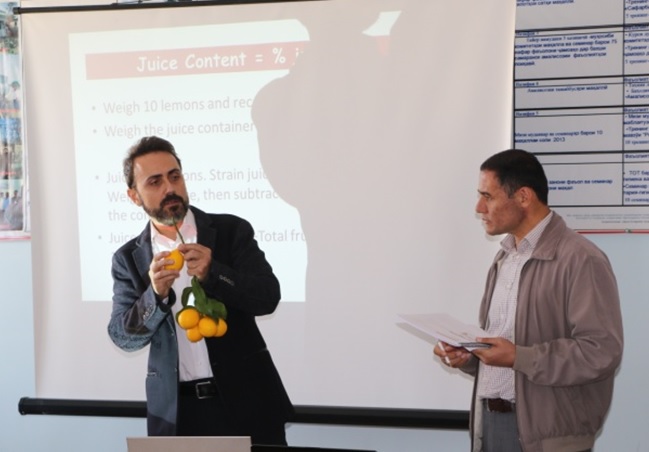
Lemon “Meyer” has been introduced in Tajikistan in 1940 and since then it has become one of the key crop and source of income for thousands of farmers. This variety has a good aroma, is very juicy and has good demand in neighboring markets. About 50% of production is exported to Kazakhstan and Russia, however, the market is becoming very demanding and to maintain and further improve Tajik’s lemons position in the market a lot needs to be done. One of the key problems of lemon producers is significant losses during postharvest period which can reach up to 30%.
According to farmers, on average when they store 35 kg in each box during the sale in April they would have 27 kg. For the last few year Chinese entrepreneurs buy lemon in bulk from local farmers and treat it with fungicide which prolongs shelf-life. Quite a few exporters and those who are involved in lemon storage were particularly interested in knowing what fungicides are used.
Within the Agriculture Commercialization Project, NIRAS has arranged a training on harvest &post-harvest practices on lemon which was conducted by Prof. Doctor Okan Özkaya on 10th of November in Bohtar district. The training was particularly focusing on international standards for post-harvest practices but considering the specific needs of small farmers who store lemons within domestic conditions. Farmers were trained on improved harvest practices, proper use of fungicides, wax paper, packaging and storage specifics. A total of 40 people participated in the training, including small holder farmers with one greenhouse, farmers with over 1 ha of land under lemon, exporters, businessmen involved in storage and export and agronomists/trainers.
It is planned to conduct an experiment with a few farmers on harvest &post-harvest practices that were introduced during the training and compare the results with traditional storage. The results will be demonstrated to farmers in spring with a follow up workshop. The long term objective is to increase the potential of small farmers in increasing their income through sale of lemon during off-season and increase export potential. Farmers activist have been chosen for the experiment who will be largely involved in demonstrating the results to other farmers in spring. The best way to introduce changes is to demonstrate the results.







